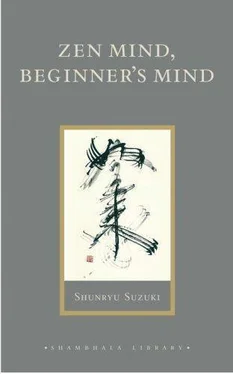Then Trudy Dixon, another close disciple of Suzuki- roshi who had much experience editing Zen Center’s publication, Wind Bell, edited and organized the manuscript for publication. It is no easy task to edit this kind of book, and explaining why will help the reader understand the book better. Suzuki- roshi takes the most difficult but persuasive way to talk about
Buddhism-in terms of the ordinary circumstances of people’s lives-to try to convey the whole of the teaching in statements as simple as “Have a cup of tea.” The editor must be aware of the implications behind such statements in order not to edit out for the sake of clarity or grammar the real meaning of the lectures. Also, without knowing Suzuki- roshi well and having experience working with him, it is easy to edit out for the same reasons the background understanding that is his personality or energy or will. And it is also easy to edit out the deeper mind of the reader which needs the repetition, the seemingly obscure logic, and the poetry in order to know itself. Passages which seem obscure or obvious are often illuminating when they are read very carefully, wondering why this man would say such a thing.
The editing is further complicated by the fact that English is profoundly dualistic in its basic assumptions and has not had the opportunity over centuries to develop a way of expressing non-dualistic Buddhist ideas, as has Japanese. Suzuki- roshi uses these different cultural vocabularies quite freely, expressing himself in a combination of the Japanese feeling-attributive way of thinking and the Western specific-idea way that to his listeners makes perfect sense poetically and philosophically. But in transcriptions, the pauses, rhythm, and emphasis that give his words their deeper meaning and hold his thoughts together are apt to be lost. So Trudy worked many months by herself and with Suzuki- roshi to retain his original words and flavor, and yet produce a manuscript that is in understandable English.
Trudy divided the book according to emphasis into three sections-Right Practice, Right Attitude, and Right Under-standing-roughly corresponding to body, feeling, and mind. She also chose the titles for the talks and the epigraphs that follow the titles, these being taken usually from the body of the lectures. The choices are of course somewhat arbitrary, but she did this to set up a kind of tension between the specific sections, titles, and epigraphs, and the talks themselves. The relationship between the talks and these added elements will help the reader probe the lectures. The only talk not given originally to the Los Altos group is the Epilogue, which is a condensation of two talks given when Zen Center moved into its new San Francisco headquarters.
Shortly after finishing work on this book, Trudy died of cancer at the age of thirty. She is survived by her two children, Annie and Will, and her husband, Mike, a painter. He contributed the drawing of the fly on page 69. A Zen student for many years, when asked to do something for this book, he said: “I can’t do a Zen drawing. I can’t do a drawing for anything other than the drawing. I certainly can’t see doing drawings of zafu [meditation pillows] or lotuses or ersatz something. I can see this idea, though.” A realistic fly often occurs in Mike’s paintings. Suzuki- roshi is very fond of the frog, which sits so still it might be asleep, but is alert enough to notice every insect which comes by. Maybe the fly is waiting for the frog.
Trudy and I worked together in a number of ways on the book and she asked me to complete the editing, write the introduction, and see to its publication. After considering several publishers, I found that John Weatherhill, Inc., through Meredith Weatherby and Audie Bock, were able to polish, design, and publish this book in exactly the way it should be published. The manuscript was read before publication by Professor Kogen Mizuno, head of the Buddhist Studies Department, Komazawa University, and an outstanding scholar of Indian Buddhism. He generously helped with the transliteration of the Sanskrit and Japanese Buddhist terms.
Suzuki- roshi never talks about his past, but this much I have pieced together. He was the disciple of Gyokujun So-on- daiosho, one of the leading Soto Zen masters of the time. Of course he had other teachers too, one of whom emphasized a deep and careful understanding of the sutras. Suzuki- roshi’s father was also a Zen master, and, while still a boy, Suzuki began his apprenticeship under Gyokujun, a disciple of his father’s. Suzuki was acknowledged a Zen master when he was rather young, I think at about the age of thirty. His responsibility in Japan included many temples and a monastery, and he was responsible for rebuilding several temples. During the Second World War he was the leader of a pacifist group in Japan. He had been interested in coming to America when he was young, but had long given up the idea when he was asked by a friend to go to San Francisco for one or two years to lead the Japanese Soto Buddhist congregation there.
In 1958, when he was fifty-three, he came to America. After postponing his return several times, he decided to stay in America. He stayed because he found that Americans have a beginner’s mind, that they have few preconceptions about Zen, are quite open to it, and confidently believe that it can help their lives. He found they question Zen in a way that gives Zen life. Shortly after his arrival several people stopped by and asked if they could study Zen with him. He said he did zazen early every morning and they could join him if they liked. Since then a rather large Zen group has grown up around him — now in six locations in California. At present he spends most of his time at Zen Center, 300 Page Street, San Francisco, where about sixty students live and many more do zazen regularly, and at Zen Mountain Center at Tassajara Springs above Carmel Valley. This latter is the first Zen monastery in America, and there another sixty or so students live and practice for three-month or longer periods.
Trudy felt that understanding how Zen students feel about their teacher might, more than anything else, help the reader to understand these talks. What the teacher really offers the student is literally living proof that all this talk and the seemingly impossible goals can be realized in this lifetime. The deeper you go in your practice, the deeper you find your teacher’s mind is, until you finally see that your mind and his mind are Buddha’s mind. And you find that zazen meditation is the most perfect expression of your actual nature.
The following tribute from Trudy to her teacher describes very well the relationship between Zen teacher and Zen student:
“A roshi is a person who has actualized that perfect freedom which is the potentiality for all human beings. He exists freely in the fullness of his whole being. The flow of his consciousness is not the fixed repetitive patterns of our usual self-centered consciousness, but rather arises spontaneously and naturally from the actual circumstances of the present. The results of this in terms of the quality of his life are extraordinary-buoyancy, vigor, straightforwardness, simplicity, humility, serenity, joyousness, uncanny perspicacity and unfathomable compassion. His whole being testifies to what it means to live in the reality of the present. Without anything said or done, just the impact of meeting a personality so developed can be enough to change another’s whole way of life. But in the end it is not the extraordinariness of the teacher which perplexes, intrigues, and deepens the student, it is the teacher’s utter ordinariness. Because he is just himself, he is a mirror for his students. When we are with him we feel our own strengths and shortcomings without any sense of praise or criticism from him. In his presence we see our original face, and the extraordinariness we see is only our own true nature. When we learn to let our own nature free, the boundaries between master and student disappear in a deep flow of being and joy in the unfolding of Buddha mind.”
Читать дальше


![Джон Харгрейв - Mind Hacking [How to Change Your Mind for Good in 21 Days]](/books/404192/dzhon-hargrejv-mind-hacking-how-to-change-your-min-thumb.webp)








